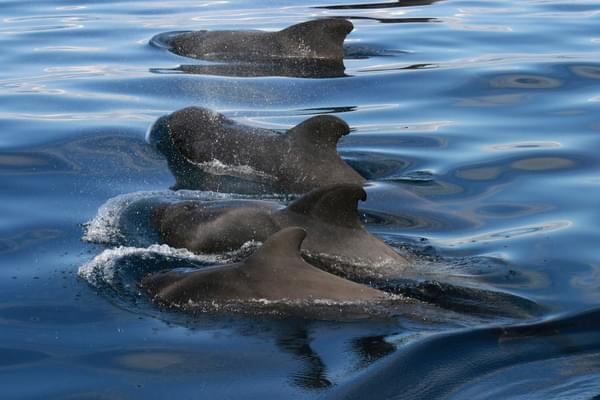The last 24 hours have seen both good and bad news for whales in the North Sea. We’ll deal with the bad first, and the news that a pod of 77 pilot whales stranded on the remote Orkney island of Sanday. Its been estimated that this is the largest mass stranding in UK waters in over a century. Last year, an entire pod of 55 pilot whales died following a stranding on the Hebridean Isle of Lewis.
The pod included adult males, measuring up to seven meters (22 feet) long, along with females, calves and juveniles. Despite herculean efforts by British Marine Life Rescue (BDMLR) responders to reach the pilot whales, who had stranded on a beach that was cut off at high tide, many were dead by the time they arrived and, as is so often the case, a decision was made to euthanize the remainder.
Many of us at ORCA have been involved in stranding response situations before and the feeling of helplessness and distress at being unable to return these magnificent creatures to the sea, which in so many cases is barely a few feet away, is something that never lessens. So we pay tribute to BDMLR for their determined efforts, as well as the Scottish Marine Stranding Scheme (SMASS). SMASS will now undertake post-mortems of the whales in an attempt to discover any reasons for the stranding event.
The good news, which has come in as we write this news update, is that the UK Government have announced an immediate halt to the exploration licenses for oil and gas in the North Sea. The seismic blasting and seabed disturbance that is associated with this activity has been shown to have a profound impact on cetaceans, but there are likely to be other impacts and consequences that we don’t even know about.

ORCA believe that everyone who cares about whales and dolphins can play an active role in safeguarding their future, and that's why we've designed our brand new e-learning courses to give more people than ever before the chance to contribute to our research. Whether it's learning to spot and identify different species or using our fantastic OceanWatchers, we have the perfect way for you to start your conservation journey and learn about the role you can play in helping us understand and protect whales, dolphins and porpoises around the world. Visit learn.orca.org.uk to find out more and book your place today!

